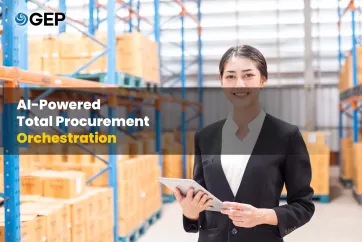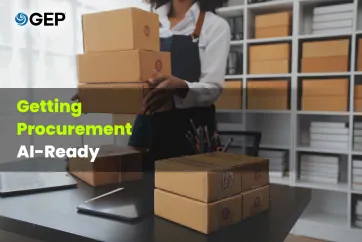
Inside the New Era of Procurement Intelligence
September 03, 2025 | Procurement Software 3 minutes read
With Protiviti and GEP
Procurement and supply chain leaders today face a perfect storm: trade uncertainty mounting cost and margin pressures, a renewed emphasis on supply chain resilience, and an accelerating push for digital transformation (inclusive of Gen AI).
Across industries, companies are turning to artificial intelligence not just to automate operations, but to unlock foresight, agility, and strategic value.
This joint perspective from GEP and our partner Protiviti, a global consulting firm, explores how AI is delivering meaningful impact today, enabling greater orchestration across procurement activities, while driving intelligent automation, and greater supply chain resilience.
Managing Resilience with Intelligence and Speed
Global trade volatility, including recent tariff wars, has left many organizations scrambling for stability. AI is proving instrumental in helping procurement and supply chain teams stay ahead of the curve.
AI can be used to enable real-time monitoring of global trade policies, supplier health and performance, and geopolitical risk. Through AI-driven software like GEP SMART™ and GEP NEXXE™, businesses can simulate scenarios with digital twins, evaluate alternative suppliers and logistics routes, and develop proactive strategies long before disruption hits.
From analyzing the impact of new tariffs to optimizing pricing and procurement cycles, AI empowers organizations to pivot quickly while maintaining competitiveness.
As Protiviti notes, “AI serves as an accelerator, assisting organizations in navigating the complexities and risks of trade wars, while addressing a multitude of procurement and supply chain needs in a timely manner.”
Procurement Agents That Think and Adapt
AI is evolving rapidly, and so is its role in procurement.
Once limited to task automation, today’s AI agents are becoming strategic collaborators.
Protiviti observes that companies are deploying “agentic AI” to manage spend, improve user experience, and enforce compliance. By transforming procurement into a conversational, guided buying journey, agentic AI helps employees quickly find the right products and services while automatically aligning with policies, budgets, and contracts. This not only simplifies the buying process and reduces friction for employees, but also drives stronger governance, eliminates non-compliant spend, and ensures consistent adherence to procedures.
AI enabled orchestration can coordinate tasks between human users, disconnected systems and agents, assigning actions based on context, urgency, and business rules. Routine decisions can be automated, but critical actions and exceptions are escalated to human users.
Agentic AI can also improve the employee experience through orchestrated, guided buying that not only streamlines the procurement process by automating routine decisions but also helps improve decision making and drive compliance with policies and procedures, creating a more agile, intelligent, and aligned procurement function.
These agents now operate across entire ecosystems, integrating with ERP, sourcing, contracting, and supplier management platforms.
GEP’s technology enables these agents to learn from enterprise data, flag supplier risk in real time, and recommend sourcing alternatives while maintaining transparency and human oversight.
As Protiviti emphasizes, “The most valuable AI agents are those that elevate procurement teams, allowing them to shift from tactical firefighting to proactive, data-informed decision making.”
Readiness, Integration & Responsible Adoption
Despite the promise of AI, many companies face significant hurdles in scaling its use effectively.
Protiviti highlights key challenges: fragmented data, legacy systems, lack of internal expertise, and resistance to change (often fueled by data security concerns). Many organizations also struggle with aligning AI use cases to real business value — or lack the governance needed to scale responsibly.
GEP and Protiviti recommend ensuring AI tools are integrated across procurement workflows — not siloed or bolt-on.
Ensuring AI readiness involves evaluating data quality and accessibility, privacy and security, infrastructure and resources, scalability and maintenance, and integration and compatibility. These considerations can serve as a checklist for organizations to collaboratively identify gaps and efforts needed to close them, ensuring cross-functional alignment between use-case/business requestors and AI/data development teams. Just as important is developing a culture of trust, transparency, and continuous learning.
Compliance and regulatory considerations must also be addressed from the start.
Building systems should avoid bias, protect privacy, ensure auditability, and preserve human oversight, especially in decisions that affect suppliers, spend, and compliance.
As Protiviti puts it, “Responsible AI governance is foundational to future-ready procurement.”
About GEP and Protiviti
GEP is a global leader in AI-powered procurement and supply chain software, helping enterprises build agile, resilient, and sustainable operations.
Protiviti is a global consulting firm specializing in finance, operations, enterprise technology, risk and compliance, legal, internal audit and financial advisory, and digital transformation and is a trusted partner in helping clients adopt and scale AI across the source to pay lifecycle.
Together, GEP and Protiviti deliver the intelligence and expertise companies need to lead in a world defined by constant change.



